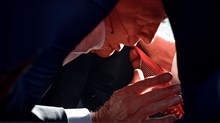As the chaplaincy tries to fill several hundred vacant positions, parachurch missions to the military are supplementing chaplains' activities with programs, materials, and missionaries. Worldwide, Christian organizations on and off U.S. military bases are running youth groups for military kids and welcoming off-duty soldiers into their homes, leading seminars and classes on Christian life, supplying chaplains with literature for soon-to-be-deployed troops, and providing many other services that overextended chaplains cannot.
More than 675,000 soldiers and their families live in the U.S. and abroad. The Army chaplaincy is "the largest young adult ministry in the world," said former Army Chief of Chaplains Gaylord T. Gunhus. With so many military family members involved, chaplains such as Lt. Col. Randall Dolinger can end up pastoring 1,500 to 2,000 people. "There's more ministry that needs to be done than chaplains can do," said Dolinger, a spokesman for the Army Chief of Chaplains Office in Arlington, Va.
Military missions operate with far fewer personnel than the chaplaincy, but organizations such as Campus Crusade still have a broad impact. They disseminate information about the gospel and Christian living through chaplains, train leaders among the troops, and maintain websites designed for soldiers, in addition to sending missionaries to bases.
If some military ministry leaders say they have not experienced the chaplain shortage as a crisis, it may be because the number of chaplains is larger than in the 1990s.
War, however, has strained chaplains and ministries even as they grow. Military Missions Network president Gary Sanders says the greatest need for ministry may be at home—multiple deployments, extended tours (now at 18 months), and a high rate of Post-traumatic Stress Disorder among veterans put tremendous pressure on military families. Civilian ministries can't operate in combat zones but can have direct contact with troops and their families on bases.
Jeff Campbell feels that ministry as a civilian allows him to specialize and to get more face time with the military kids he ministers to than he would as a chaplain. "Any time there's a shortage, I end up having more opportunities to have meaningful ministries," Campbell said. He is director of Malachi Ministries, the youth ministry branch of Cadence International. Cadence International is a Christian military contractor that encompasses Malachi Ministries and hospitality ministries for soldiers on leave. As the chaplaincy looks for ways to expand its reach, Campbell said, anybody who wants to work with the military can run programs at the chaplain's invitation. "It becomes a great value for the government."
Dolinger explains how chaplains start a relationship with parachurch ministries. "Lots of people offer [services], and we use whatever comes our way," he said. However, "it's not equal time to all groups regardless of quality. We give them space commensurate with the impact they're having." Troops, whether in combat zones or at home, generally do not have much free time to spend in organized religious activities, he said.
The five largest parachurch military ministries are Campus Crusade's Military Ministry, Officers' Christian Fellowship, Cadence International, Association for Christian Conferences Teaching and Service (ACCTS), and the Navigators.
Sanders says that many people who work for these organizations have a military background themselves. "There's a lot of passion and a great burden out there among parachurch workers to reach their fellow servicemen and women with the gospel." Even to the initiated, the military is much like a foreign mission field, according to Sanders. "God, I believe, called me to be a crosscultural missionary to the military people group," he quipped.
The chaplaincy exists to fulfill the First Amendment, according to Dolinger. First Amendment religious rights in the military are tricky to maintain, due to issues of representation and free speech. Recent controversies about conversion and evangelism, highlighted by a lawsuit accusing the Air Force Academy of religious intolerance, have made some well-established military ministries skittish.
Both parachurch organizations and military personnel have to be aware of divisions between a soldier's official duties—even if they include providing religious services—and other activities. Blurring the lines can be considered an ethical breach. On July 27, the U.S. Department of Defense's inspector general released a report on the alleged misconduct of nine military personnel. Two of them were exonerated in the report. The officers, including four generals, appeared in a Christian Embassy fundraising video filmed in the Pentagon. The Department of Defense objected that their endorsement (in uniform, and without the permission of superiors) gave the "appearance of government sanction," violated regulations on wearing uniforms, and provided a selective benefit to the Christian Embassy. The Department of Defense has not decided what disciplinary action to take.
Dolinger sees a distinction between proselytizing—which is forbidden—and evangelizing. "Proselytizing involves trying to force people to join a particular group" by using rank to corner or intimidate someone. "I would say that any group that comes in evangelizes," he said. "But I don't think we'd let anyone in who'd proselytize." Since organizations that personally minister to troops are working through the permission and with the knowledge of the chaplain, they are generally careful not to cause offense.
"The military is a pluralistic environment," said Campbell, "so if anyone is going to succeed here, you need to be pluralistic." "Pluralism"—taken here to mean the ability to function as a minister in a multi-faith environment—is held up as the ideal for troops, chaplains, and ministries that work on bases.
To Campbell, the principle of respect guides the ministry. "That translates to speaking freely about what I believe but not criticizing what others believe," he said."We try to create an environment of dialogue, not monologue."
Campbell explained that to maintain the trust of the military and school administrators he works with, he takes an indirect approach to kids' spiritual questions. "We put them on a path to self-discovery. We really stick to basics: How do I understand my Bible? How does it affect my relationships? Where does Jesus fit? When it comes to denominational stuff (baptism, etc.), we direct them to the chaplains."
Campus Crusade Military Ministry's frank, evangelistic approach falls within those parameters. The Campus Crusade website explains the gospel in several places and provides resources for chaplains both in the U.S. and in foreign militaries. The organization offers rapid deployment kits including Bibles, devotionals, and tracts, which chaplains can request and distribute to their units. The organization has delivered more than 1.5 million kits since September.
"We're not doing anything tricky," said McCandless. "We just make ourselves available." Campus Crusade's Military Ministry has a broad range of programs designed to reach both Christian and non-Christian troops and their spouses. It has more than four decades of experience and runs entirely on donations for its full-time staff and programs. Volunteers round out teaching programs, such as Sunday schools.
In view of the chaplain shortage and ongoing military conflicts in Iraq and Afghanistan, Sanders said, "there's going to be a greater need for chaplains and churches and these parachurch ministries to work together more closely than they've done in the past."
Campbell continues to keep in touch with former members of the youth group, Sanders is excited about the frequency of e-mails he receives asking how to set up a ministry to military families, and Military Ministries said the real measure of its ministry "comes through the many letters we receive from soldiers and chaplains." A chaplain assistant in Iraq wrote them to "thank you so much for all you have done for us. The Rapid Deployment Kits are one of the tools that we depend on to help us complete our mission."
Copyright © 2007 Christianity Today. Click for reprint information.
Related Elsewhere:
"Nurturing the Living," about the causes of the chaplain shortage, accompanies this article.
Malachi Ministries' mission statement describes the influence their youth ministers aim to have on military kids. Malachi Ministries is a division of Cadence International, which focuses on the military in general.
Military Ministry, a part of Campus Crusade for Christ, has six "pillars" of ministry: evangelism and discipleship, leadership, families, spiritual resources, and internet outreach.
The US army provides more information about its chaplain corps on its website.
Ministering to Military Families blog has postings about church, parachurch, and chaplain ministry to the military, as well as more links to organizations that are involved with military ministry.
The Military Missions Network seeks to help chaplains, churches, and other organizations coordinate their ministries to troops. They produced a guide to ministering to the military with information about military culture and the unique needs of troops and their families.
Christianity Today's special section on Christian soldiers is available online.

Support Our Work
Subscribe to CT for less than $4.25/month


















